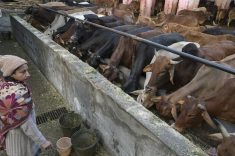If nothing else, it’s always good to be heard.
On April 22 representatives of U.S. farm groups attended a Commodity Futures Trading Commission hearing to discuss the chaos in agricultural futures markets.
One farm lobby, the American Farm Bureau, was satisfied it had a chance to speak its piece, even though no concrete decisions came out of the meeting.
“We were pleased that the CFTC recognized the gravity of the situation,” said Kelly Ludlum, a lobbyist with the Farm Bureau. “I don’t think you could walk away from the meeting thinking that all is well for traditional hedgers in the marketplace.”
Read Also

Canada-U.S. trade relationship called complex
Trade issues existed long before U.S. president Donald Trump and his on-again, off-again tariffs came along, said panelists at a policy summit last month.
Ludlum said it’s unclear what the CFTC will do.
“I think it’s probably too early to press the CFTC, to determine ‘what’s next?’ ” she said.
However, she’s hopeful the commission will eventually take action. A review of daily trading limits, along with additional delivery points, are a few steps the CFTC could take, she said.
The CFTC called the forum after receiving pressure from farmers and market participants. In the first few months of 2008 the futures markets have resembled gambling tables rather than risk management tools for farmers and grain merchandisers.
Limit up price moves in almost all commodities have become the norm. As well, it has become accepted wisdom among many traders that futures and cash are now unrelated markets.
The CFTC hearing looked at a few of the problems plaguing the markets, including how it’s nearly impossible to hedge using futures.
The loss of the futures as a risk management tool was the biggest concern of Jerry McReynolds, a farmer from Kansas who represented the National Association of Wheat Growers at the hearing.
“The problem is that (farmers) can’t protect themselves like they need to,” McReynolds said.
“You’ve got to be able to use those markets to lay off that risk.”
He said many U.S. farmers cannot lock in prices for new crop because elevators refuse to take on the risk.
Nonetheless, McReynolds was pleased by the discussion at the CTFC hearing. He said the wheat growers association doesn’t expect the CFTC to make radical changes, but something needs to be done.
One idea that came out of the hearing caught his attention – a market for grain swaps.
“We may need a few different tools,” he said.
“Maybe some kind of ag swap, where it would be possible for those deferred bushels (new crop) … to be traded in some way.”
On the same day as the hearing, the Chicago Board of Trade asked the CFTC for permission to clear over-the-counter swaps for corn, wheat and soybeans. Swaps are forward agreements where the size and expiration date are tailored to suit specific needs of the buyer and seller.
From the perspective of the Canadian Wheat Board, the most significant issue in the futures markets is the lack of convergence.
“We’re on two sides of the market,” said Curt Denisiuk, the board’s director of commodity risk management.
“We’re selling grain to customers and on the other side, we’re offering prices to producers.”
As a result, the board is in a precarious situation when futures prices behave erratically relative to cash prices because it depends on an orderly futures market to offset its risk.
“When we offer prices to producers, we have to allow for that (unpredictable basis) and protect ourselves,” he said.
McReynolds agreed that basis has moved beyond normalcy and almost beyond comprehension.
“At one time in my life, I actually knew what basis was,” he said.
“I don’t think I could even explain it now.”















